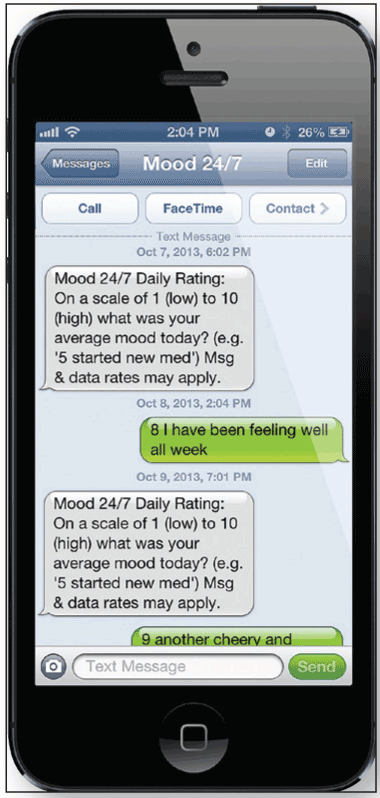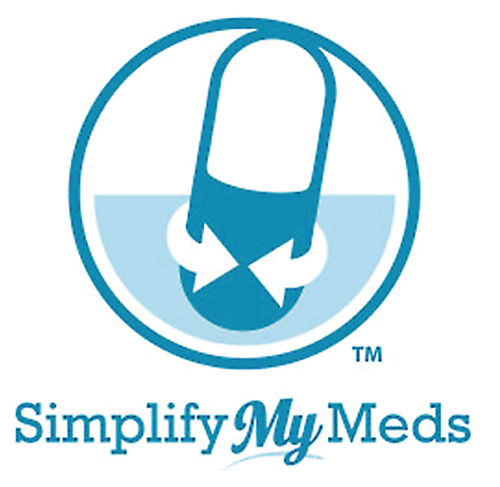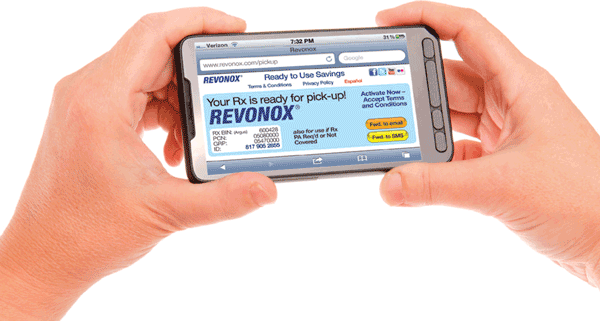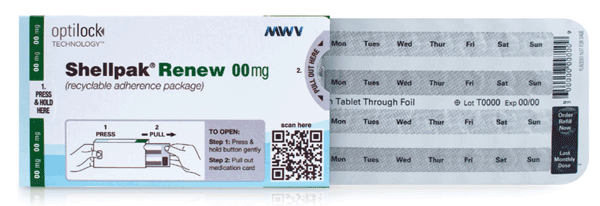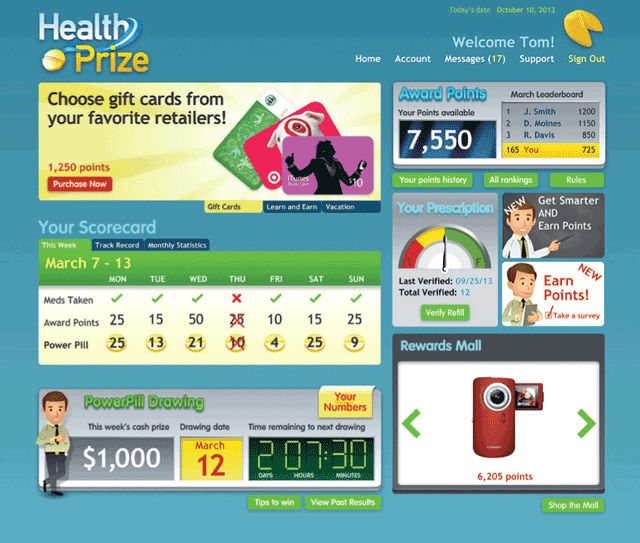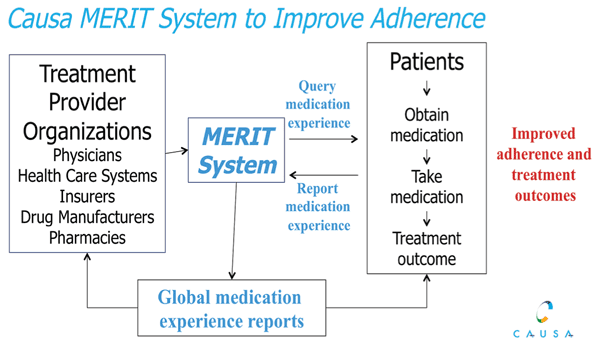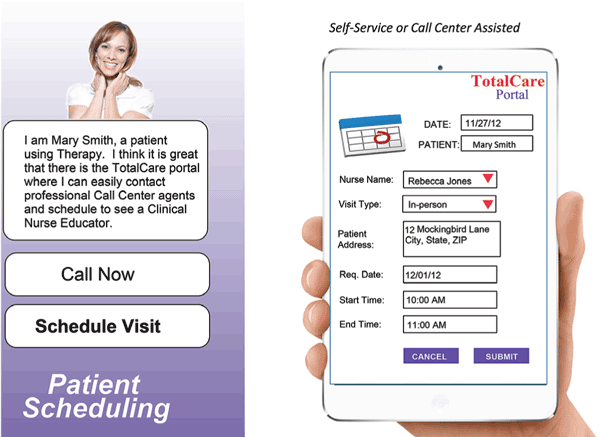Poor adherence to medications is as bad for the healthcare system (billions of dollars lost annually) as it is for patients. These 10 innovative approaches offer solutions for better adherence and improved outcomes.
Behavioral Health Management Solution
Mood 24/7
Remedy Health Media
Terence Finn, CTO
www.remedyhealthmedia.com
Mood 24/7 (www.Mood247.com), a web-based mental health tracking and care coordination technology invented by Dr. Adam Kaplin of Johns Hopkins Medicine and developed by Remedy Health Media, makes it as easy as possible for patients to manage their mental healthcare.
Mood 24/7 is like a virtual “medical home” for mental health. Communication initiates through text messages or email and allows users to track their daily mood. Individuals may sign up securely and select a time to receive daily text messages. Text message responses are added to an online personal mood chart that can be shared with doctors who can quickly see both the continuum of moods and—through annotated entries—what may be triggering mood changes. The result is better treatment and better outcomes.
The simplicity of the platform has also been shown to statistically increase patient adherence to daily mood tracking. Active users respond to between 80% and 90% of daily text messages sent to track mood, making this text message-based program more effective than subscription e-mail tracking programs that report an average open rate of 20%* and a click-through-rate of just 3%*.
Re-launched this summer, Mood 24/7 boasts over 11,000 users and 500 registered physicians. Future planned enhancements include automatic alerts to providers and friends with parameters set by the user and or provider. Remedy also plans to add passively gathered data such as exercise, sleep and prescription usage.
*Silverpop’s 2013 Email Marketing Metrics Benchmark Study
Pharmacists Take Action
Simplify My Meds
National Community Pharmacists Association
B. Douglas Hoey, RPh, MBA, CEO
doug.hoey@ncpanet.org
NCPA launched a major initiative, Pharmacists Advancing Medication Adherence (PAMA, bit.ly/PAMAreport), that connects pharmacists with patients to improve care and lower costs. As part of PAMA, we launched Simplify My Meds. This turnkey adherence program synchronizes all of a patient’s medications to be refilled on the same day each month and can identify cost-saving alternatives, both of which can improve adherence. Currently, more than 1,500 pharmacies are providing this service to more than 50,000 patients.
We’re also working to educate policymakers about the value pharmacists provide. Our inaugural National Report Card on Adherence (bit.ly/NCPAReportCard) found that Americans over 40 with chronic conditions earn a troubling C+ average when it comes to taking medications correctly. The survey also reinforced pharmacists’ importance, finding that patients’ personal connection with their pharmacist is the biggest predictor of adherence.
Regarding tomorrow’s pharmacists, we’re collaborating with groups like the American Association of Colleges of Pharmacy to develop tools that can be incorporated into pharmacy curriculum and engaging students with national campaigns like Million Hearts and Script Your Future, which unite pharmacists, patients and caregivers to improve adherence
Automated Hovering
The Heart Strong Program
Penn Medicine Center for Health Care Innovation
Shivan Mehta, MD, MBA, Director of Operations
Shivan.Mehta@uphs.upenn.edu
Many studies show that less than half of patients are taking life-saving medications in the year after a heart attack. Despite efforts to improve this in the last decade, adherence is still poor. However, new wireless monitoring technology and an increasing focus in healthcare financing on population health have created an opportunity for new service delivery models with the potential for improved health outcomes. Additionally, new findings in behavioral economics and health suggest that incentives and social influence could have the potential to improve healthy behavior. Researchers at Penn Medicine (Center for Health Incentives and Behavioral Economics & Center for Health Care Innovation) have developed a new approach to healthcare delivery called automated hovering, which takes advantage of these trends to improve health outcomes.
The Heart Strong program was funded by the Center for Medicare and Medicaid Innovation to develop and test automated hovering in a population of patients who have been recently discharged from the hospital after a heart attack. The program is recruiting patients in the Philadelphia region and nationwide through a partnership with Horizon Healthcare Services, Independence Blue Cross and Aetna. Through remote monitoring medication devices and a web-based platform, patients are enrolled in daily lotteries to promote adherence, and they identify a friend or family member to act as a feedback partner if they do not open their pill bottles for two days. Finally, an engagement advisor will reach out for support to the patient as needed if they remain non-adherent for four consecutive days. The goal of this intervention is to leverage social science and design to provide support in an efficient and customized way for the patient through communication in the modality of choice (automated voice recording, text message, email).
Combined Interventions
Co-pay Driven Adherence Programs
PSKW
Chris Dowd, Senior Vice President, Market and Product Development
cdowd@pskw.com
As a provider of co-pay savings programs, we recognize that although reducing patients’ out-of-pocket costs has a significant positive effect on adherence, co-pay assistance cannot and does not solve adherence challenges singlehandedly. As a result, we are constantly seeking new ways to combine co-pay assistance with other interventions to create a synergistic adherence benefit. Fortunately, as patients opt into a co-pay savings program (via IVR, web or text) they can simultaneously enroll in an engagement/reminder program. This gives us and our clients the opportunity to test a wide array of adherence boosters in conjunction with co-pay assistance.
We find that adherence improves when patients are allowed to select their preferred method of engagement, and patients increasingly prefer text and email. The co-pay assistance email/text programs we deploy vary widely in sophistication and components, from simpler programs such as traditional time-based email/text refill reminders, to more technologically advanced programs deploying advanced real-time personalized messages like these:
- Your out-of-pocket is $XX
- You saved $XX
- You have X refills remaining
- Google map of pharmacy
- Your Rx is expiring XX/XX/XXXX
- Inactive over XX days
- You joined, but have not redeemed
In a recent live-program test, patients enrolled in a PSKW program refilled anywhere from one additional Rx (for simple programs) to four additional Rxs (for advanced programs). Of course, we work with clients to ensure HITECH requirements are met, and we collaborate with CRM providers to ensure proper exchange of information.
Calendared Blister Packaging
Shellpak Renew with Optilock technology
MWV Healthcare
David Dwyer, Vice President, Global Strategic Marketing & Innovation
David.Dwyer@mwv.com
Medication non-adherence is a complex problem, and studies show that a multi-disciplinary approach to the issue is most effective. There are many solutions that improve medication adherence, including pharmacy programs, disease management and customer relationship management programs. However, of all the interventions available, medication adherence packaging is uniquely effective both when used alone or as the foundation for broader adherence programs.
MWV’s evidence-based approach has informed our medication packaging design, resulting in innovations that have been proven in multiple studies to significantly increase length of therapy and proportion of days covered.
In a peer-reviewed article published in Clinical Therapeutics, data showed that when used alone, MWV’s Shellpak medication adherence calendared blister packaging demonstrated a statistically significant impact over vials, improving adherence and persistence for long-term, once-daily medications.1
In another peer-reviewed study, this one involving Novartis Pharmaceutical’s Diovan HCT packaged in MWV’s Shellpak with on-pack educational communication, patients’ length of therapy increased significantly when using a combination of reminder packaging and educational messaging.2
Unlike stand-alone blisters or vials, adherence packaging, such as MWV’s Shellpak or Shellpak Renew with Optilock technology, provides space for medication information, patient education and program links to effectively drive complementary adherence initiatives. For example, a QR code on the package can link to a brand’s disease management website, auto-refill program, mobile app or loyalty program. Since most patients interact with their medication daily, packaging can serve as the conduit to a broader adherence program.
References:
1. A pharmacoepidemiologic analysis of the impact of calendar packaging on adherence to self-administered medications for long-term use. Clinical Therapeutics. May 2011; 33(5).
2. Real-world impact of reminder packaging on antihypertensive treatment adherence and persistence. Patient Preference and Adherence. 2012: 6; 499–507.
Adherence Rewarded
The HealthPrize Engagement Engine
HealthPrize Technologies
Katrina Firlik, Co-Founder and Chief Medical Officer
kfirlik@healthprize.com
The HealthPrize online and mobile platform gathers daily medication compliance data from patients, accurately verifies all prescription fills, and rewards patients for adherence and other forms of engagement. Financial incentives—as extrinsic motivators—drive the system and come in several forms, including loyalty points, weekly sweepstakes and monthly competitions with prizes awarded to the highest point earners per month. Education, in the form of weekly disease-specific quizzes and daily “fortune cookies” (all for additional points), is a key driver of intrinsic motivation.
Patients self-report their daily adherence via the method of their choice: Response to daily email, daily text message, via the mobile app or online via their dashboard. These daily messages also serve as valuable medication reminders for patients who wish to use them as such.
The HealthPrize platform verifies each initial and subsequent prescription fill in one of three ways:
- Via direct data feed from the supporting brand’s co-pay card vendor or a participating PBM.
- Via a patient’s online account with their pharmacy, PBM or insurer. If a patient does not have an existing account and login credentials, they are prompted to set up an account upon registration with HealthPrize, if desired.
- Via mobile/online upload of photo of prescription receipt or label.
HealthPrize is the only adherence solution on the market that can cover all prescriptions in the U.S. by flexible use of this array of techniques. This capability is a significant strength in a market of solutions that rely largely upon self-reporting alone.
Customized CME
Personalized Educational Platform
Medscape Education
Kathleen N. Geissel, PharmD, CCMEP, Vice President Learning Design and Measurement
Teresa S. Marshall, Evaluation Reporting Director
http://www.medscape.org/vision/contact-us
Innovative approaches to clinician engagement, quality-focused interventions and educational assessments can be accomplished via a purposeful use of technology that meets actual clinician needs, rather than a traditional education that broadcasts the same message to all comers. Medscape Education developed a web-based Personalized Educational Platform to direct learners to a customized mix of continuing medical education (CME) activities designed to narrow gaps in knowledge, skill, performance or understanding, as identified by their responses to a baseline survey instrument.
A personalized education model has been used multiple times in CME, notably in examining adherence to HIV medication and antiretroviral therapy (ART) regimens. Medscape’s program concentrated on the education clinicians need to improve patient adherence to ART. Following participation in their personalized CME recommendations, U.S. physicians managing patients with HIV (N=175) demonstrated statistically significant improvements in their ability to influence adherence through optimal assessment and self-reporting strategies, awareness of predictors of and risk factors for adherence/non-adherence, reflexive listening and other communication opportunities, as well as the use of technology to increase adherence to ART.
Physicians play a key role in cultivating patient adherence to ART. With good provider communication linked to improved adherence and outcomes, leveraging technology to create a personalized educational experience is transforming CME for optimized results.
This CME program was supported by unrestricted, independent educational grants from Gilead, Bristol-Myers Squibb and Janssen; all content was developed according to all standards of commercial support, including independence from any commercial interest and with no input or influence from the supporters.
Suite of Solutions
The Four “A”s Strategy
OPUS Health
Paul Kandle, VP and GM
Paul.Kandle@opushealth.com
Each patient has individual needs, opinions and motivators. In the end, there is not one answer and certainly not one proven solution that will address this industry need for improved adherence. That being said, we at OPUS Health look at this challenge from a different perspective. Whether you call it engagement, empowerment or something else, we feel the solution lies in providing patients with options linked to their personal preferences. Our goal at OPUS is to ensure “no patient is left behind” through access to a complete suite of solutions to help them manage their condition. In addition, we use analytics to determine areas of opportunity and make “on the fly” program adjustments.
We created a strategy referred to as the OPUS four “A”s: Access, Action, Analytics, Adherence.
- Provide the largest solution set for patients to gain access to programs, leverage apps, online communities, portals and other areas where patients go to gain knowledge.
- Once engaged, analyze their actions, create cohorts and move patients along the journey by recommending activities that have proven successful for other patients.
- Develop and share analytics with customers to provide meaningful insights and collaborate on key decisions to enhance program performance.
- Closely monitor patient adherence, analyze trends and gaps. Leverage relationships with other key stakeholders in the process who are focused on the same goals.
There is no silver bullet solution—but there are actions that can be taken, in concert, to help patients manage their condition and encourage medication adherence.
Doctor Check-ins
MERIT (Medication Experience Reporting Intervention Tool)
Causa Research, Inc.
Robert E. Anderson, CEO
randerson@causaresearch.com
Causa Research offers a novel, patent-pending, patient interaction system to improve patients’ adherence. The Causa system, MERIT (Medication Experience Reporting Intervention Tool), mimics interactions between patients and doctors that are powerful motivators for better adherence behavior. Generally instituted on web-based or smartphone platforms, MERIT involves patients in reporting their treatment experience, asking them to provide answers to a short set of questions that creates a sense of trust, responsibility and urgency in using the treatment. While patients are non-adherent for many reasons, the Causa MERIT system addresses many of the most common reasons, including fear of side effects, forgetfulness and cost, among other factors. Causa MERIT is designed to reduce both primary (not filling the medication) and secondary non-adherence (poor use of the medication, lack of understanding and early discontinuation).
The MERIT system was based on clinical observations, backed up by scientific research studies, which showed that patients are much better at taking a medication right before their doctor visits. Researchers at Wake Forest University School of Medicine, a leading adherence research center, worked to find a way to harness this phenomenon and developed a means of querying patients about their medication experience at regular intervals. In one published randomized controlled trial of the MERIT system in a very non-adherent population, median adherence improved from 32% to 74% using the Causa adherence intervention. Causa has an exclusive license to this intellectual property through Wake Forest Innovations and designed the MERIT system to address a broad spectrum of treatment areas including cardiovascular and mental health conditions.
A Team Approach
TotalCare
Ashfield Commercial
Dan Piggott, CEO
dan.piggott@ashfieldhealthcare.com
Education and training play a significant role in ensuring patient adherence. Our delivery model for this has evolved significantly, resulting in our TotalCare service. It offers a unique multiple touch point, integrated patient care-team approach that has proven itself effective in improving patient adherence. TotalCare combines clinical nurse educators, call center patient advocates, and field sales representatives, along with multi-channel delivery mechanisms to identify appropriate patients and educate them, their HCPs and their staff to the safe and effective usage of the brand.
As no two people are alike, the TotalCare team first assesses patients based on their non-adherence risk and tailors an appropriate program. Each outreach element is kept as flexible as possible to react to the individual patient’s needs. Once our TotalCare call center specialists have identified the patients and established education plans, they pass along referrals to the field-based Clinical Nurse Educator (CNE) team member, who contacts the patient directly to schedule an appointment. Appointments can be held in-person or online to suit the patient’s preference. The TotalCare team instructs patients on all aspects of the brand and provides patients with links to online videos and other instructional material patients can view at their leisure or share with their TotalCare partner. Using our back-end databases, which track patient participation and level of engagement within the program, we can then schedule appropriate follow-ups. TotalCare CNEs share patient progress with the HCP and their staff, and HIPAA-compliant information is also provided to field sales representatives to aid their physician details in addressing any scientific data pertinent to the brand.



